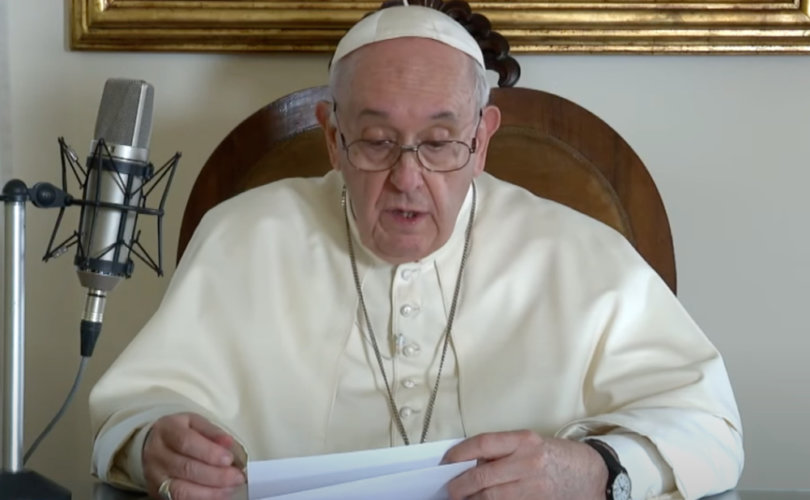VATICAN CITY (LifeSiteNews) — Pope Francis delivered a message via BBC Radio Friday, in which he called for “radical decisions” to respond to “the unprecedented threat of climate change,” but did not mention God or moral aspects pertaining to the Catholic faith.
Speaking on the BBC’s regular three-minute spiritual reflection, broadcast Monday through Saturday at 7:45 a.m., the Pope dealt with issues of “climate change” and COVID-19, ahead of the climate change COP26 conference about to begin in Glasgow on Sunday.
“Climate change and the COVID-19 pandemic have exposed our deep vulnerability and raised numerous doubts and concerns about our economic systems and the way we organize our societies,” began the Pope.
Referencing a “sense of powerlessness and loss of control over our lives,” Pope Francis described a “perfect storm” of “crises,” in the fields of “health care, the environment, food supplies, and the economy, to say nothing of social, humanitarian, and ethical crises.”
Such crises demand “radical decisions that are not always easy,” but provide “opportunities that we must not waste,” he said. They can be “a genuine moment of conversion, and not simply in a spiritual sense,” added the Pope.
Pope Francis was echoing his words from March of this year, when he called for a “new world order,” saying that the “drama of wasting” the COVID-19 “crisis” would be worse than the disruption caused by COVID measures across the globe.
Continuing his address to the BBC audience, the Pope drew on themes contained in his encyclical Fratelli Tutti and declared that such a “conversion” could only come through “solidarity based on justice” and “recognition of the unity of our human family in God’s plan for the world.”
Warning of an “immense cultural challenge,” the 84-year-old Pontiff spoke of prioritizing “the common good.” He mentioned a “new outlook, in which the dignity of every human being, now and in the future, will guide our ways of thinking and acting.”
In language appearing to echo the now common globalist phrase “build back better,” Francis spoke of the “most important lesson” as being the need “to build together, so that there will no longer be any borders, barriers or political walls for us to hide behind.”
Referencing a preliminary COP26 meeting with religious leaders and scientists, held in the Vatican in conjunction with the U.K.’s ambassador to the Holy See, Francis highlighted the “Joint Appeal” they drew up, which dealt with “care” for the earth, reducing carbon emissions and lowering the global temperature. The Joint Appeal also asked political leaders to “expel the seeds of conflicts: greed, indifference, ignorance, fear, injustice, insecurity and violence.”
“Humanity has never before had at its disposal so many means for achieving this goal,” Pope Francis told the BBC. “The political decision makers who will meet at COP26 in Glasgow are urgently summoned to provide effective responses to the present ecological crisis and in this way to offer concrete hope to future generations. And it is worth repeating that each of us — whoever and wherever we may be — can play our own part in changing our collective response to the unprecedented threat of climate change and the degradation of our common home.”
The Pope’s radio address further drew on the text of the Joint Appeal of October 4, in which he and the other signatories noted that to achieve the goals of the pro-abortion climate change Paris Agreement, “the COP26 Summit should deliver ambitious short-term actions from all nations with differentiated responsibilities.”
Pope sounds like ‘any old secular political activist’
The Pope’s radio address drew criticism from both Catholics and non-Catholics. Political commentator Mike Yardley wrote that the message was “politicised & begins with Climate Change & covid and goes on to note … we must ‘re-access our common purpose’ and ignore borders (which may be a reference to migration). He links Climate Change with spirituality.”
Meanwhile, Catholic U.K. blogger Laurence England translated the Pope’s call to “conversion, and not simply in a spiritual sense,” as “not conversion in the spiritual sense at all?”
“I surmise from what he says that Francis has rejected the supernatural life for himself and rejects it also for others,” mused England. “Nothing he has to offer is about Christ. Nothing.”
Matthew Hazell, a contributor to New Liturgical Movement, described Pope Francis as “any old secular political activist,” and contrasted his message to Pope Emeritus Benedict XVI’s own Thought for the Day reflection in 2010.
Broadcast on Christmas Eve, Pope Benedict XVI spoke of the “holy season” of Christmas, of Christ’s death and resurrection, and promised his “prayers” for the whole of the “English speaking world.”
Pope Francis’ radio broadcast came just hours before he met with staunchly pro-abortion U.S. President Joe Biden in the Vatican, in a meeting which reportedly focussed on “protection and care of the planet,” as well as COVID and refugee related topics.
The pontiff and the president also discussed “the protection of human rights, including freedom of religion and conscience,” according to the Vatican’s press release.

